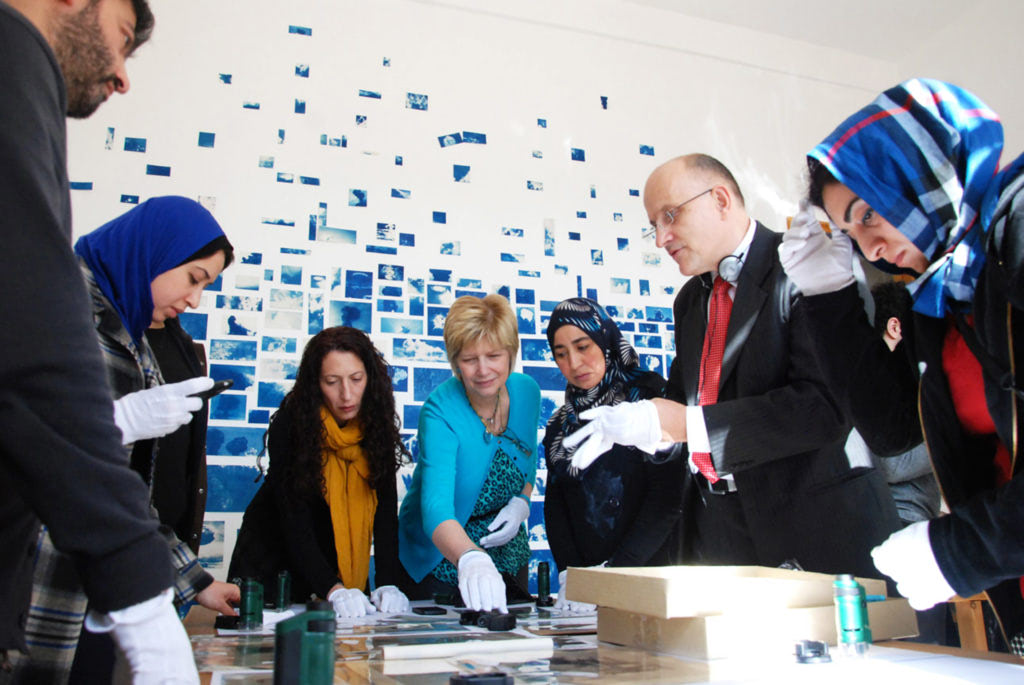Earlier this year, the Middle East Photograph Preservation Initiative (MEPPI) launched its third photograph preservation course in the history-laden surroundings of Darat al Funun, a platform for the arts based in Amman, Jordan. Seventeen participants joined from the broader Middle East and North Africa to take part in the eight-day intensive workshop that marked the start of the year-long training from which they will benefit.

Launched in 2011, MEPPI is led by the Arab Image Foundation (AIF) in Beirut, the Getty Conservation Institute, University of Delaware and The Metropolitan Museum of Art, and is supported by a grant from The Andrew W. Mellon Foundation with additional funding from the Getty Conservation Institute.
This strategic initiative seeks to work toward the preservation of the region’s rich photographic heritage, by identifying significant photograph collections, and building a strong network of conservation professionals.
Since its inception, MEPPI has provided training for 57 institutions and collections in 16 countries, helping to preserve more than 15 million photographs. Trained institutions have included national archives and libraries, ministries, universities, as well as museums and private collections.
“It’s been an extraordinary experience of strategic importance for my institution,” noted Ziad Rajab, MEPPI alumnus and director of the Tareq Rajab Museum in Kuwait. Following his training, Rajab conducted a full inspection of the museum, leading to the reorganization of storage sites, the establishment of clear policies and the development of an emergency plan. Volunteers were recruited among students to assist with these efforts, thereby engaging with the younger generations.
Other MEPPI alumni, despite the many financial and administrative challenges they face within their institutions, have reported impressive improvements in storage and housing conditions, as well as in documentation and digitization of collections. Often, what appear as minor steps can represent significant accomplishments when put into perspective. Kaouther Dridi, from the Centre de Documentation Nationale in Tunisia, succeeded in acquiring a scanner and computer to digitize and make accessible at-risk photograph collections, despite the institution’s enormous financial and political challenges. “I am proud to be able to give more importance to my collection and to be able to report this to my supervisors,” she said.
“From collections care to expert advocacy, community engagement, partnerships big and small, and new exhibitions and scholarship, MEPPI has and will continue to strengthen the preservation of significant photographic collections across the Middle East, North Africa, Iran and Turkey,” emphasized Debra Hess Norris, chair of The University of Delaware’s Department of Art Conservation and a lead instructor for the MEPPI training workshops. She also added, “MEPPI is much more than a photograph preservation workshop-it is about building professional networks and treasured personal friendships.”
By bringing together collection custodians from diverse countries and institutional backgrounds, MEPPI has helped to strengthen professional networks both within and across institutions. Following their participation in the same MEPPI course in 2012-2013, Abu Dhabi Tourism & Culture Authority participants’ Fatima Al Dhaif, Abdalla Mohamed Bastaki, Jo-Fan Huang and Daniel Suarez now form a formidable group of advocates for professional exchange in the United Arab Emirates (UAE). Meanwhile, in Morocco, a cooperation agreement is being signed between the Ecole Nationale d’Architecture and the National Library and Archives of Morocco, both trained by MEPPI.
MEPPI alumni continue to show their clear commitment and dedication to the goal of photograph preservation in their countries. Heba Farid, part of Contemporary Image Collective – a working group of photographers, curators, anthropologists and historians based in Cairo and promoting preservation and advocacy in Egypt – has surveyed some 25 local collections, contributing to mapping further the region’s rich photographic heritage. These are precious efforts and events, such as the January 2014 bombing of the 111-yearold Museum of Islamic Art, are there to remind one of the urgency of such missions.
Among the most significant successes of MEPPI is the empowerment of those trained, giving them the skills and confidence to further their professional growth and become local experts in the field… and the results are highly encouraging. Fatima Al Dhaif from the UAE and Ibrahim Abdel-Fattah from Egypt have chosen to pursue graduate programs in conservation and museum studies at Camberwell College of Arts and George Washington University. “As there are now graduates of MEPPI in most Middle East countries, we could play a role in the mentoring process. I would be happy for any future participant to approach me for assistance”, indicated a MEPPI alumnus and passionate private collector.
“This workshop has taught me different options for display and storage that I can use in the practical part of my thesis, and it will prove extremely helpful when teaching my course on photograph conservation in the future,” said Maha Ahmed, one of the first to specialise in photograph conservation at Cairo University.
“Launching MEPPI has been extremely important for the Arab Image Foundation”, said acting director Rima Mokaiesh. “It has helped to position us as pionniers in the field of photograph preservation in the region, and we have since been increasingly active and approached by other collections for training and collaborations.”
Following a successful three-year run, MEPPI is now planning for the next phase to include further advanced workshops and a symposium that will bring together MEPPI alumni, experts and decision-makers – a strategic step to ensure the long-term sustainability of the broader Middle East’s photographic heritage.

course in Istanbul, September 2013. Photo by Reem Akl
Click here to download article
Share this Article:
This article is intended for educational purposes only and does not replace independent professional judgment. Statements of fact and opinions expressed are those of the author(s) individually and, unless expressly stated to the contrary, are not the opinion or position of Tru Vue or its employees. Tru Vue does not endorse or approve, and assumes no responsibility for, the content, accuracy or completeness of the information presented.
